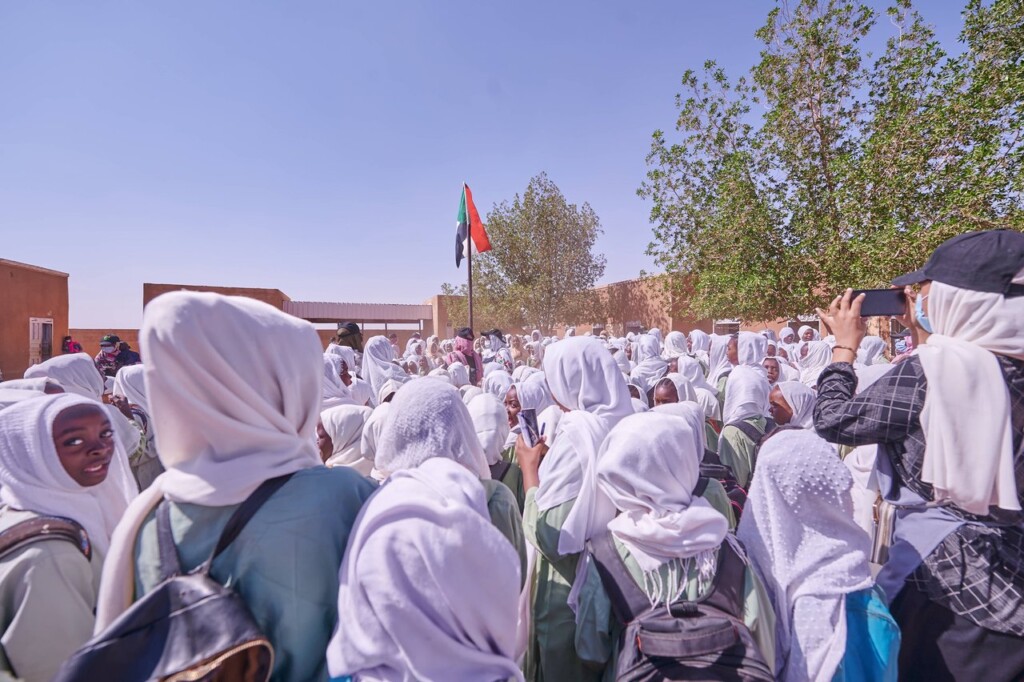Teachers suspend strike as ‘sign of goodwill’ to Sudan gov

Schoolgirls in Sudan (File photo)
KHARTOUM / KARKOUJ / PORT SUDAN / WAD MADANI / EL FASHER / NYALA –
The Sudanese Teachers Committee (STC) has decided to temporarily suspend their strike which has been ongoing for almost two months. Teachers in several states announced the continuation of the strike until the demands are met.
STC member Duriya Babiker told Radio Dabanga that the committee will suspend the strike, which started in December, from Sunday for a period of two weeks in the hope that their demands are met. She described the move as “a sign of goodwill to the Sovereignty Council.”
The STC will continue to boycott secondary school exams in Khartoum and will not prepare students for them. They plan to submit a memorandum to the federal Ministry of Education demanding that the current school year is extended.
In Karkouj in Sennar, the Teachers Committee carried out a vigil to protest the refusal of the education department to pay 44 teachers’ salaries.
Teacher Khaled Mohamed told Radio Dabanga that the education department of El Suki locality agreed to pay the salaries, but it was blocked by the Karkouj administrative unit yesterday.
Strike continues
In contrast, the Red Sea state Teachers Committee, Unified Teachers Committee in El Gezira, and Teachers Committee in North Darfur are continuing to strike until all demands are met and all imbalances in teachers’ salaries are addressed.
In a statement on Saturday, the committee in Red Sea state said that “the cash alternative” from the Education Ministry arrived a week ago but has not been disbursed yet. In addition, salary increases will not be paid, according to the statement.
The Unified Teachers Committee in El Gezira will continue to strike until salary increases, allowances, and extra three-month dues are paid, according to a statement.
The Teachers Committee in North Darfur will continue to strike, but schools will open on Tuesday and Wednesday “as a sign of good faith.”
Teacher Abdallah Hasan, a member of the North Darfur Teachers’ Entitlement Claim Committee, told Radio Dabanga that they have expressed their concerns about the method of disbursing the cash alternative. In one locality, large crowds formed after all government teachers were called to receive their payment at the same time.
The Blue Nile Teachers Committee has not yet reached a decision on suspending the strike. “Our vision will become clear on Monday after a meeting with the Blue Nile region governor and the Minister of Finance,” according to their statement.
Information officer of the Blue Nile Teachers Committee Mona Balla explained that paying personal income tax is the responsibility of the governor and minister.
Classes resume
The federal Ministries of Education in Red Sea state and El Gezira ignored the statements and announced the resumption of classes yesterday.
The Minister of Education of El Gezira affirmed every teacher’s right to strike in a statement. However, “it requires the presence of teachers in the school.” He explained that closing schools “is only permissible by the state.”
The minister stressed that any school principal who closes school doors should be held accountable, as well as absent teachers.
At the same time, the Ministry of Education and Guidance of South Darfur also announced that classes “at all education levels” would resume in government schools.
The Director of the Ministry of Education, Omar El Tom, called on the teachers to return to work. He reassured parents and students that the ministry plans to compensate them for classes they missed during the strike.
Private schools
Many private schools in Khartoum have continued classes ‘as normal’ after a mid-year holiday was suddenly announced in January. Private education has increased in Sudan, according to El Doma Abdelrahman, Secretary of the Press Office of the Private Schools Union in Khartoum.
It is becoming increasingly common to send children to private schools in the capital of Sudan, where about 1,200,000 students are enrolled. The private sector counts approximately 6,000 schools and 8,000 kindergartens, according to Abdelrahman.
During his speech at a media workshop organised by the Press Office on Saturday at the Academy Model School in Kafouri in Khartoum North, he stressed that the private education base of students, teachers, and workers exceeds 1,350,000.
Outstanding dues
On February 12, teachers in Khartoum should have begun to receive any outstanding dues and salaries which have been delayed, including those in January, according to Undersecretary of the federal Ministry of Finance and Economic Planning Abdallah Ibrahim. The other 17 states will follow soon, Ibrahim said in a press statement on February 9.
In an interview with Radio Dabanga following the announcement, leading member of the STC Muawya Abdeen said that the Ministry of Finance reneged on the agreement to increase spending on education to 14.8 per cent of the budget and announced an increase to 10.7 per cent instead.
He said that the Ministry of Finance is only implementing some of the issues agreed on in Khartoum “with the aim of dividing the teachers.”











 and then
and then